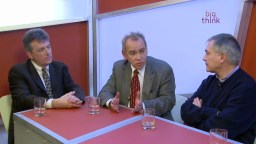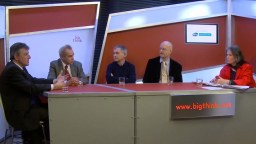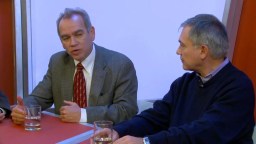Dr. Samuel Gandy
Associate Director, Mount Sinai Alzheimer's Disease Research Center
Dr. Samuel Gandy is a professor of neurology, psychiatry, and Alzheimer's disease research at Mount Sinai Hospital. He is also associate director of the Mount Sinai Alzheimer's Disease Research Center, and chairman emeritus of the National Medical and Scientific Advisory Council of the Alzheimer's Association.
Dr. Gandy is an international expert in the metabolism of the amyloid proteins that clog the brain in patients with Alzheimer's disease.
Genetic testing is advancing rapidly, and we can now find out our risk factor for developing Alzheimer’s. But without a cure or treatment available, what’s the point?
▸
3 min
—
with
Studies have shown that you can boost brainpower and brain resilience with vitamins and exercise, and by not smoking. But lifestyle choices alone can’t prevent Alzheimer’s?
▸
7 min
—
with
Alzheimer’s starts in one area and spreads all over the brain, like an infection. Does this mean that it’s possible to develop a vaccine?
▸
6 min
—
with
Genes such as APOE4 may signal a risk factor for Alzheimer’s. But how do we separate risk factor from an unalterable sentence for the disease?
▸
8 min
—
with
Amyloid plaques and neurofibrillary tangles inside the brain are the best explanation we have for how Alzheimer’s develops.
▸
5 min
—
with
Mental decline, on some level, is inseparable from aging. With more people living longer, does this mean everyone will eventually get Alzheimer’s?
▸
6 min
—
with
One of the most robust environmental risk factors identified for Alzheimer’s disease is traumatic brain injury. This is having repercussions for those returning from fighting in Iraq and Afghanistan.
▸
4 min
—
with
Amyloid buildup in the brain is a key trigger in Alzheimer’s disease, but some people with this plaque live their entire lives without developing the disease.
▸
7 min
—
with
Are women and African-Americans at a higher risk for Alzheimer’s—as some data suggests—or are there other factors in play?
▸
3 min
—
with
For much of the past 100 years, little was known about Alzheimer’s disease and dementia. But recent research is revealing the neurotransmitter and genetic defects behind the disease.
▸
5 min
—
with










